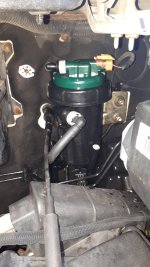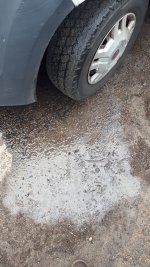Perhaps I do not qualify, as I have yet to experience even a single filter failure, and the request for advice was quite clearly limited to those with experience. My apologies if my contribution is unwelcome.
After I worked out that the all black plastic bodied UFI filter on my 2006 2.8jtd
was essentially what was referred to as a "green filter", I developed a keen interest. Also the tank mounted fuel filter on our 2011 Saab 1.9TTid, is also a very similar black plastic UFI unit.
The green filter fitted to x250 models gained a bad reputation for developing leaks after servicing.
I have read of spare filters being carried. I am sure that you will understand the reason why!
The most plausible explanation seemed to be, a failure to follow correct procedure, and use the necessary tools when servicing. A special tool set is needed to hold the filter body, and cap when dismantling, and on reassembly. There is a specified torque to apply when refixing the cap.
I have not previously learned of apparently new filters failing, either singly, or repeatedly. Another explanation is required.
I can only think of three possibilities, of which I will mention two, as I regard the third as improbable.
1. The replacement filters were old stock, and the sealing "O" rings had aged.
2.. The low pressure fuel circuit on the vehicle, is running at a higher than normal pressure. The pressure is apparently controlled by a relief valve contained in the tank mounted fuel lift pump, but there is also a relief valve in the 4 way coupling downstream from the filter. Maximum pressure is quoted as 5 Bar in Fiat eLearn. Checking the pressure would require fitting special plumbing and a gauge.
Regarding 1 above, this could be more easily eliminated by correctly fitting a replacement filter cartridge and "O" ring. This is assuming that a replacement element would be newer stock than the complete filter.
"O" rings do, or did have a shelf life of perhaps 10 years. During my working life, I was closely associated with those who found this out the hard way, when service items drawn from stores failed, and new "O" rings had to be obtained from the makers. With the size of the plant involved, it was not a small job to repeat.
Link to element change procedure



